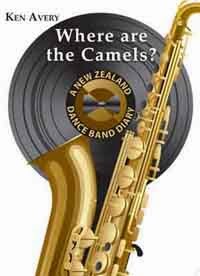Drum Boogie
Bruce Morley was a full-time freelance musician – a drummer – from 1964 till just recently. That’s remarkable enough in itself in this tiny country, but Bruce was so much more: a writer, an early columnist at NZ Musician magazine, a radio programmer, a New Zealand music lobbyist, tennis player, a historian, and a raconteur – and a dedicated correspondent to newspapers on all manner of topics. On 22 November 2012 he died, after a long battle with cancer.
Among the people he drummed for were (deep breath) Cleo Laine and John Dankworth, Spike Milligan, Harry Secombe, Matt Monro, Johnny Tillotson, Rolf Harris, Marty Feldman, Cilla Black, Vera Lynn, Winifred Atwell, Danny la Rue, Vince Hill, Tiny Tim, Ronnie Corbett, Des O’Connor, Val Doonican, and the Inkspots. The New Zealanders he backed included John Rowles, Shona Laing, Robbie Ratana, Larry Morris, Suzanne, John Grennell, Midge Marsden, Billy T. James, Howard Morrison, Suzanne Prentice, Patsy Riggir, Tom Sharplin, Ray Woolf, Ray Columbus, Gray Bartlett, Brendan Dugan – and hundreds of lesser known names.
One of the people he was proudest of backing was Ricky May, perhaps the most challenging of all these people. Bruce’s memory was razor-sharp and he wasn’t backward with an opinion. The morning after the Auckland launch of Blue Smoke, it was Bruce who texted to ask “What’s up with p. 310?” He was gently telling me, early, that the photo of Ricky May was not in fact Ricky May but Ken Cooper. Someone had to let me know, and I’m glad it was Bruce. “I’m probably the only person who played with both Ricky and Ken,” he said.
History was always a passion. In the early 1990s he researched and wrote scripts for Tainui Stephens’ great documentary series on Maori musicians, When the Haka Became Boogie. For Music in New Zealand in 1993 he evocatively described the experience of witnessing so many Maori musicians play on the Sydney club circuit when he arrived in Australia in 1964:
There were more Maori performers than I had ever seen at home, working as solo performers or in groups of all shapes and sizes … There were groups with names like the Maori Hi-Five, the Maori Troubadours, the Maori Hi-Liners, the Quin Tikis, the Maori Volcanics, the Sheratons, the Maori Premiers, Te Pois, Te Kiwis, the Maori Minors, Maori Hakas, the Milford Sounds and many more … When I returned to New Zealand some years later, I discovered that very few of the general public knew much about the performers I’ve just mentioned, apart from the most prominent ones. It was as if it had happened somewhere else, in a dream.
Born in 1940, Bruce grew up in Hawke’s Bay – “too young for Glenn Miller and too old for Bill Haley”. His childhood wasn’t musical, but in 1960 he dropped out an architecture degree and bought a drum kit. He dedicated himself to learning the instrument, and moved to Australia in 1964. “They were golden years for Australian show business,” he told Midweek newspaper (11 August 2004). “Having established that I wanted to be a professional working musician, I learned to read music quite quickly.”
He was the founding music director at Radio Pacific in 1979, and through the 1980s was a dedicated advocate of New Zealand music on radio. He often led his own groups, such as the Bruce Morley Sextet at the Second Tauranga Jazz Festival in 1964 – a track from this performance is on YouTube. He also played in theatre bands for years, especially at the Mercury – including the premieres of Hair and Oh Calcutta – and for children’s music shows. In 1963 he wrote a piece called ‘Drums By Four’, played by a quartet that also featured other leading local drummers Don Branch, Tony Hopkins and Allan Nash. He was always generous to his peers: among other New Zealand drummers I remember him championing were Barrie Simpson and Billy Nuku.
The study of drumming was a lifelong passion for Bruce (his email address was “Different Drum”). In 1963 he interviewed most of New Zealand’s top drummers for a monograph on the craft in New Zealand. All answered the same set of questions, and typically they came from a wide variety of music styles. Among those interviewed were Don Branch, Ted Croad, Eddie Croad, Lachie Jamieson, Tony Hopkins, Bruce King and Billy Nuku. (Bruce’s favourite drummers from foreign parts? Charlie Watts and Shelley Manne.)
In 2006 Chris O’Connor interviewed Bruce for NZ Musician magazine. Peter McLennan provides other links at DubDotDash (including a great photo by Richard Cotman). In 2004, Bruce described his philosophy of playing music: “It’s more than technique – you have to feel it. When you can’t stand the music or the people you’re working for, you fall back on professionalism, do the job well, and enjoy that. I take pride in playing and, for the last 40 years, I’ve played mostly other people’s music – drumming as a ‘service industry’ – but for the next 20 I plan to do more of my own.”
Sources: anon, Midweek, 11 August 2004; Bruce Morley, ‘The Launching of Nga Matua,’ Music in New Zealand, Winter 1993; ‘RIP Bruce Morley’, DubDotDash.



Trackbacks